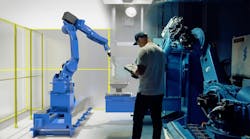By Lynne Sherwin
U.S. manufacturing companies are reaping measurable benefits from smart technologies, but many are still implementing the basics and feel they are behind the curve, according to a new study from Deloitte.
The Smart Manufacturing and Operations study, “Navigating Challenges to Implementation,” said companies reported improvements of up to 20 percent in production output, 20 percent in employee productivity, and 15 percent in unlocked capacity from their investments in smart manufacturing.
In the near future, 78 percent of companies surveyed plan to allocate more than 20 percent of their overall improvement budget to establishing foundational technologies such as clean data analytics, sensors, cloud computing and artificial intelligence (AI). Over the next two years, 46 percent of respondents ranked process automation as the first or second priority for investment, 37 percent ranked physical automation first or second, and 24 percent ranked factory synchronization first or second.
Advanced smart factory tech, such as AI and digital twins, remains further in the future, Deloitte said, as many respondents felt their organization’s maturity in technology, data and automation only just meets industry standards, and they are still establishing those foundations to connect and optimize technologies that will enable more advanced capabilities.
“While many have risen to the challenges of transformation and are seeing the benefits of Industry 4.0 — with 92 percent surveyed saying they believe smart manufacturing will be the main driver for competitiveness over the next three years — the study finds low technological maturity in the areas of human capital and workforce, material management and maintenance,” the company said in a press release.
“The smart manufacturing journey is still emerging, but its value is undeniable. Our survey shows that most responding manufacturers agree with the need to invest in smart manufacturing but require help navigating operational complexities to see meaningful results,” said Tim Gaus, Smart Manufacturing business leader and principal for Deloitte, in the press release. “Smart manufacturing prepares enterprises to be ready for increased demands and, in an era where increased capacity can set companies apart, organizations that have already invested in smart manufacturing solutions will likely have an advantage; those who haven’t may not be able to defer much longer.”
The labor shortage remains a concern, with 48 percent of respondents reporting moderate to significant challenges in filling production and operations management roles, and 46 percent reporting trouble filling planning and scheduling roles.
While 48 percent of respondents reported having a smart manufacturing training and adoption standard in place, the workforce was at the lowest maturity level of all smart manufacturing categories surveyed. Thirty-five percent of those surveyed were concerned about upskilling their employees to work with advanced technology.
For a recent story about Deloitte’s 2025 Manufacturing Industry Outlook, Gaus told Plastics Machinery & Manufacturing that generative AI could help solve the labor problem, allowing companies to capture the expertise of veteran employees to help the next generation, as well as making manufacturing jobs more appealing to younger workers.
“When a new employee who maybe doesn’t have those years of experience is running that injection molder, or whatever piece of equipment, and runs into a problem, they can query using normal human language and say, ‘I found this problem, how should I think about it?’ ” he said.
Cybersecurity is also a top concern for companies, as Deloitte Global’s 2024 Global Future of Cyber survey showed that 40 percent of respondents have publicly reported six to 10 cybersecurity breaches in the past year.
Cyberattacks against manufacturers are on the rise, reports Smart Industry. Manufacturing environments can be particularly vulnerable to attacks, as industrial control systems (ICS) and SCADA (Supervisory Control and Data Acquisition) networks were built as isolated systems, never meant to connect to the internet, according to a recent report from IndustryWeek.
Respondents to the Smart Manufacturing and Operations study ranked technology readiness — which includes the need to protect technologies and data from cyber adversaries — as the second-largest aspirational change for leaders, after workforce issues.
Deloitte’s survey, conducted in August and September 2024, compiled responses from 600 executives from companies with an annual revenue of $500 million or greater, with more than 1,000 employees that either have headquarters or operations in the U.S. Companies represented include consumer products, industrial products and construction, energy and chemicals, mining and metals, automotive, transportation, aviation, life sciences and technology.
More on smart manufacturing
About the Author
Lynne Sherwin
Managing Editor
Managing editor Lynne Sherwin handles day-to-day operations and coordinates production of Plastics Machinery & Manufacturing’s print magazine, website and social media presence, as well as Plastics Recycling and The Journal of Blow Molding. She also writes features, including the annual machinery buying survey. She has more than 30 years of experience in daily and magazine journalism.










